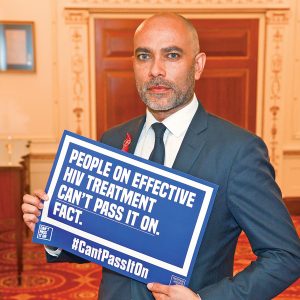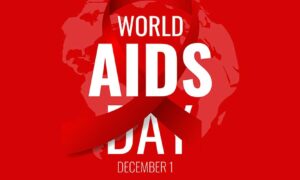When it comes to HIV, the term ‘undetectable’ is a relatively new one. Put simply, an HIV positive person can achieve undetectable levels of the virus following effective antiretroviral therapy (HIV medication). Once that person has had an undetectable viral load for over six months, they cannot pass HIV on to their partner. Now Terrence Higgins Trust has launched its ‘Can’t Pass It On’ campaign, to educate the wider public and reduce stigma. Luke Till asks THT’s Medical Director Michael Brady about the finer detail.
Dr Brady, we’ve seen brilliant statistics recently that show a drop in new diagnoses of HIV among men who have sex with men – what does this news mean and how can we continue to reduce the figures?
After years of high rates of HIV diagnoses among gay and bisexual men, it is remarkable to see evidence of such a sharp drop in England. This demonstrates what can be achieved when we utilise all the weapons in our arsenal against HIV transmission. This includes access to condoms, testing, PrEP and diagnosing and treating people as early as possible so they can become uninfectious. This is extremely positive news for gay and bisexual men, who continue to be one of the groups most affected. However, it is no time for complacency and we must keep this momentum going, so we can see the same thing happening in other at-risk communities. If we can build on this incredible progress with continued investment in HIV testing and prevention, including a long-term NHS funded PrEP programme for all those who are at risk, this could be the beginning of the end for HIV transmissions in the UK.
Can you explain what you do at THT?
I’m Terrence Higgins Trust’s Medical Director. I’ve been with THT for 12 years altogether; I started off as a trustee and then about 10 years ago as the organisation developed to take on the delivery of clinical services – particularly HIV testing services – we needed a medical role and since then we’ve expanded to a team of myself and four nurses who work around the country. My main role is overseeing the clinical governance of our services; making sure they’re safe and that they’re as high quality as possible.
PrEP has been a game-changer in the battle against HIV, but is there a danger that people on PrEP could stop using condoms and consequently we’ll see an increase in diagnoses of other STIs like Hepatitis C?
I don’t think it’s overstating it to say PrEP is a game-changer, when it’s used in partnership with the other effective prevention strategies; more testing and people who are HIV positive being on treatment prevents transmission as well. It’s not a silver bullet on its own, but it’s something that will be used in combination. We’ve only just scratched the surface of maximising the impact.
We do need to be aware of concerns around STIs and Hepatitis C, but the research data that we have so far is reassuring. Studies like the PROUD study didn’t show any difference in rates of STIs or Hepatitis C, when comparing the groups that were on PrEP with the groups that weren’t. So the message that comes out of studies like that is that the men who have sex with men in those studies were already at a high risk of STIs, and PrEP didn’t make a difference to those rates. And in a way that’s a reflection of the fact that those studies targeted the right people – the ones at greatest risk of HIV – and that’s why we saw so much impact.
As time goes on, it will be something that we need to monitor. Some people are concerned that if condom use goes down, because of the concern of HIV being lessened, there potentially could be a rise in STIs. I think the reality is, as we soon get to the position where thousands who need PrEP are on PrEP, to start with we might see a rise in STIs, but that may not be about behaviour change, it may actually be because we’re testing more. When we have a well designed PrEP programme and we’re able to attract a group of people who are at risk of HIV and other STIs into regular three-monthly testing, which the majority of people most at risk aren’t doing yet, I actually think that we could eventually see rates of STIs go down as infections are diagnosed and treated earlier and onward transmission is prevented.

Can you explain the terms ‘undetectable’ and ‘uninfectious’. Are they the same thing?
Undetectable refers to somebody’s viral load. A viral load is a blood test we do for people living with HIV to measure how much of the virus is in a millilitre of their blood. A result for someone who has HIV but is not on treatment might be in the tens or hundreds of thousands. In the very early stages of infection, the first few weeks and months, people have very high viral loads, in the tens of millions, and then it tends to settle down. Later if they don’t have access to treatment, it tends to go up again. So it measures how active the virus is.
The flip side of that is when people go on treatment. Treatment works by suppressing the virus, stopping it from reproducing, and therefore brings the amount of virus in the blood down to what we call an undetectable level.
So essentially ‘undetectable’ means that the virus is still there but it’s there in such small amounts that the machine in the lab cannot detect it. For most people, and certainly in this country, that means being ‘under 20’; most labs would report an undetectable viral load as ‘less than 20’. So we use the achievement of an undetectable viral load as a measure of success of treatment.
What uninfectious means is a word used to describe the likelihood of somebody passing the virus on to somebody else. We’ve known for probably a couple of decades that the single biggest thing that determines the likelihood of HIV being transmitted from one person to another is the viral load: the higher the viral load, the more likely you are to transmit; conversely the lower the viral load, the less likely you are to transmit HIV.
The ‘undetectable equals uninfectious’ message, which is a really important message for us at THT to be getting out now, has come about after years of research building up to the point where we’re confident to communicate that message. And that message is, if you’re on effective treatment (meaning you have an undetectable viral load), you can be confident you won’t pass the virus on to other people. It’s an important message, it’s a shift in our language, and the reason we’ve shifted is the result of a study published recently called the Partner study, which looked at couples – one partner positive with an undetectable viral load, the other negative, who were having reasonable amounts of sex without a condom, and there were no HIV transmissions from one partner to another during that study. Zero HIV transmissions, out of 58,000 acts of sex without a condom.
So to be clear, can a person living with HIV who has an undetectable viral load transmit HIV?
No. A few years ago I wouldn’t have said that with such confidence, because of the reasons we’ve just been through. There were people saying that with confidence years ago, something that is referred to as the ‘Swiss Statement’, which was really saying what we’re saying now. That was based on scientific expert opinion, but there wasn’t all the evidence there is now to back it up. And I think, for me, it’s taken the build up of evidence, and particularly the Partner study, for us to move from wording that was probably a little greyer – ‘probably not’, ‘extremely low risk’, ‘very unlikely’ – to ‘no’ and ‘cannot’. I would be confident with any of my patients who are stable on their treatment with an undetectable viral load to say to them ‘you don’t need to worry about passing the virus on to others’.
If a dose of HIV meds is missed is there a window of opportunity – like with the pregnancy pill, if a dose is missed and a woman could fall pregnant – is it a similar concept for viral load to increase and therefore the undetectable status is compromised?
Obviously we encourage regular tablet taking, so if you’re taking them about the same time every day, what you’re doing is ensuring that you always have good levels of drug in your system – more than good levels – to suppress the virus. If you miss a dose, what happens is the drug levels slowly drop down. HIV drugs have been developed so that when you take them regularly the amount of the drug you have in your system is way more than you need to suppress the virus, so actually there’s a window, a forgiveness, in there. So if you miss a dose and your level is dropping, it doesn’t drop suddenly – well, different drugs drop at different rates – but you don’t suddenly lose control of the virus. It is a major commitment to take tablets every day for decades, so it would not be unusual to occasionally miss a dose – people are humans, not robots. The occasional missed dose is not going to make any difference, because you have that forgiveness window.
Having said that, if you have sustained missing of doses then your viral load will go up and it can start to go up relatively quickly, so it will go to detectable levels after a few days of missing doses. Now it’s difficult to be more specific about it because everybody’s individual, it depends on what medication they’re on, but the longer you go without taking regular medication, the less you can be confident that you have an undetectable viral load.
So my advice would be if people miss a dose rarely or occasionally then I wouldn’t worry about it. If people do have an extended number of days without taking it then my advice – a bit like your contraception pill analogy – is assume you’re no longer uninfectious – just as a woman should assume she is at risk of pregnancy – get back on your drugs as soon as possible, and go to your clinic where we can do a viral load to check that things have got back under control, and in the meantime use condoms or avoid sex.
What if an HIV positive person gets a cold, for example, or an STI – this lowers the immune system giving their viral load the chance to increase, correct?
Something like a common cold, definitely not. HIV drugs are so good – if you’re taking them regularly you can be really confident that your viral load will remain undetectable, whatever happens. And any other illness, really, I wouldn’t worry about the viral load.
The issue about STIs has been a potential concern over the years and the reason for that is that there is some evidence to show minor blips in your viral load when you have an STI. Obviously when we measure viral load we measure the virus in the blood, but for most people that’s not where the potential risk of transmission comes; it comes from semen or from the vagina, cervix or rectum. But in general if you’re undetectable in your blood you will be undetectable in the genital tracts – that’s why transmission doesn’t occur.
Interestingly another important part of the Partner study is the fact that around 16% of the gay men in that study had STIs, and they still didn’t transmit. So, for me, that gives more confidence, and it comes back to the power of the antiretroviral drugs.

Has the message of undetectability that has been put into the public domain recently been too simplistic? Because while people have gained a lot of confidence from it, there are also many who are wary of it.
No, I don’t so. I think the simplicity of it is really important. We’ve just launched our ‘Can’t Pass It On’ campaign and our message is clear: people living with HIV on effective HIV treatment cannot pass on the virus. We wouldn’t be putting out such a simple message if we weren’t confident about it. And I think you’re absolutely right, there is a wariness about it, and that’s understandable: we’ve spent decades really driving home the message that it’s all about condoms, and condoms are still important, but this is a really significant shift in the medical evidence and therefore the messages we are giving to people. Personally I think the message is not out there nearly enough. I regularly have conversations in the HIV clinic with people for whom it’s a surprise. And even if it’s not a surprise, understandably it takes quite a lot of time to have the confidence in it. So I think we’re only beginning to scratch the surface of getting the message out – initially to people living with HIV, never mind the broader general public. But I think it is so important to get the message out and I think the simplicity enables us to communicate it as easily as possible, because it can be so impactful on both the lives of people living with HIV and those who are not. But also in terms of the general confidence in their own health and wellbeing, it’s a really important message to people living with HIV; taking away that anxiety and concern, giving the choice to have sex without condoms if they want to and if they and their partner have had tests for other STIs, taking away the anxiety if a condom breaks. Being able to have open confident discussions with sexual partners, being able to negotiate the type of sex that they want to have, is so important, and it’s a key message that we at THT are focussing on.
Terrence Higgins Trust has launched the ‘Can’t Pass It On’ campaign, to reduce stigma and help stop HIV. Keep an eye out at London Pride where the team will be proudly marching to say ‘People on effective HIV treatment can’t pass it on’. Find out more at www.tht.org.uk/cantpassiton and #cantpassiton. Every share will help educate and change lives.















